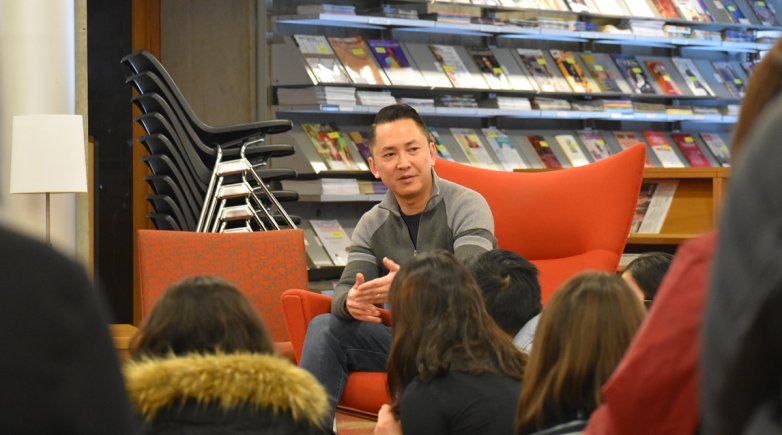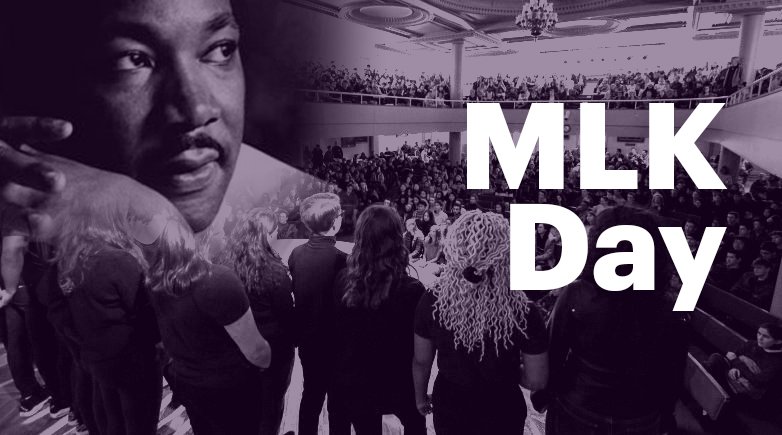Pulitzer winner shares tough love
Viet Thanh Nguyen offers a sobering assessment of the "American Dream" during a two-day visit to campus.
Novelist Viet Thanh Nguyen speaks with students during a Q&A session in Library Commons.
In a sobering critique of the American condition, visiting author Viet Thanh Nguyen challenged Exeter students to tell authentic stories about the “complicated and contradictory” country we live in today.
The Vietnam-born novelist, whose acclaimed The Sympathizer won the 2016 Pulitzer Prize for Fiction in part for rising to that challenge, sugar-coated little to an assembly audience about growing up as a minority and a refugee in California in the 1970s and '80s. Lamenting what he called a “narrative scarcity,” Nguyen said he and his Asian friends struggled to find a voice and a vocabulary reflective of their circumstance.
“We were forever foreigners, and if we ever wanted to become anything more than that, our next best option — still the best option today — is to become honorary whites,” Nguyen said. “That’s a very difficult situation to find yourself in.
“What I realize now, what I didn’t realize then, was that I needed more voices, more stories from people like us. Asian immigrants, Asian refugees, Asian-Americans. I needed more voices and more stories from Latinos and African-Americans. … From women. From gays and lesbians.”
Nguyen said stories have power, “because they tell us something very fundamental about who we are and who we imagine ourselves to be.”
'You have to speak up'
Nguyen’s assembly address, punctuated by a standing ovation from the audience, was the opener of a two-day visit made possible in part through the Haley Lecture series, an endowed annual lecture series started in 1989. He delivered public remarks later that evening in Assembly Hall and gathered the following morning in the Library Commons for a Q&A session with about 50 students, many of whom were members of the school’s Asian Voices affinity group.
The author listened to students talk about their experiences as minorities in the United States and noted that people like the assemblage of students before him had been grouped together as "Asian" by other cultures.
"You're not 'Asian' in Asia," he laughed. "That's a European construct. If you were to tell a person in Vietnam they were Asian, they would be like 'I am?!'"
Nguyen talked to the students about the origins of the term Asian-American and shared stories about his own childhood, which began in Vietnam, continued as a refugee in Pennsylvania and then the Bay Area of California. He describes himself as "born in Vietnam, but made in America," and because of that, he has grown up in a different circumstance than his parents, an outcome common for many first-generation Americans whose parents emigrated here. "They did this for you, but as a consequence, you're different from them."
One student asked if it was her job to educate other people about Asian culture.
"That's your choice," Nguyen replied. "It can be exhausting, right? So it's not your obligation, but if you want to, you should." He said the presence of Asians and other minorities at Exeter was already working to open eyes and minds, "but you can't assume institutions will change simply because you're there in significant numbers. You have to speak up."
Two Americas
That sentiment of challenging and changing institutions ran through his assembly address, and Nguyen was blunt with his assessment of the “American Dream” as being too simple a narrative.
“For me, the basic contradiction is that we’re a country of the American Dream, of possibilities — and it’s true, I came here as a refugee, I wrote a book criticizing the United States and I get a Pulitzer Prize for it. That’s really crazy. That’s the beauty of the story, the beauty of the American Dream.
“But at the very same time, there exists another America that has always been there. And that’s the America that was built on colonization, slavery, genocide, expropriation. These two Americas exist at the very same time and always have.”
Read Nguyen's essay "I Love America. That's Why I Have to Tell the Truth About It."
Nguyen was critical of “Make America Great Again” rhetoric he perceives to champion a period in which immigrants and minorities were discriminated against or banned, oftentimes legally. He said America’s greatness lies ahead, not in the past.
“Our challenge is to embrace an America that loves everyone,” he said. “A complicated and contradictory America. A beautiful and brutal America about which we need to keep on telling stories. We need to tell stories about an America who talks about building bridges instead of walls, that opens hearts instead of closes minds. We need to tell these stories every day to ourselves, to others, to everybody who will listen.”




